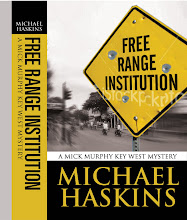What can a writer learn from small-town politics and businesses? When it comes to writing our books, a lot. For one thing, if you follow politics, you know nothing is etched in stone. Nothing.
The example I thought of today, while having breakfast with my son Alex at Banana Café in Key West, had to with do how, only a year or two ago, the chamber of commerce and many business and political leaders decided the city needed to cater to upscale tourists. Shorter stays, more expensive hotel rates.
The business leaders and politicians figure to be rid of the family tourist and go for those that spend big. Hell of an idea and it gets you to fill your coffers and streamline your business and government.
There is a section of the island, when you drive in, called the triangle. Along the triangle, there are four or five motels/hotels (six or one, half dozen of the other) and the plan by the owner of the property was to tear them down and put up condos, one upscale hotel, and a convention center. Great plan, since the economy was booming (or we were fooled into believing it was).
It reminds me of mentally mapping out my second novel. I had a beginning and an end and soon pieced together what was needed to go from page one to page three-hundred. Now, all I had to do was write each day and my story would end on page three-hundred, as I planned it.
Like the plans of the property owner, it didn’t work out as planned.
For him the economy went into the toilet, so he didn’t demolish the property. The motels/hotels stayed open. That was a good thing for him, since he didn’t have a large payment on empty land to make.
However, other businesses on the island were counting on all those rooms to be off the books and that would allow them to raise prices! Oh yeah! In their business plan for the year, some counted on the new rates. Well, they didn’t come.
In writing, for me, sometimes a character says or does something that changes were I am going and I have to adjust. Sometimes, the story takes on a life of its own because of words or actions that I thought I controlled, but in reality, the story flows on its own and all I do is record it!
Of course, as the writer, I could scrap where the story seemed it wanted to go and I could stick to my sketchy outline; I needed to get to the end, which I know, so follow the plan.
My personal belief is if you follow the plan, the story isn’t as strong because the characters are not as strong. Go with the flow and adjust.
Businesses were caught short, because the rooms didn’t go off the market. Some lowered their prices, got ride of mandatory five-night stays and survived. Others kept to the plan, laid off employees and survived, but not as strongly as those that adjusted their prices.
A bad book is not better than no book. A business that survives is not as good as a strong business.
How do politics get involved in this, you ask.
Well, if room rates go way up, upscale visitors come to the island and there is more money and more money equals more tax revenue and that helps the city. Local politicians were in favor of that, but it didn’t happen.
Now, this year’s budget hearings are suggesting higher tax rates, but most property owners are homesteaded and their taxes cannot go up but a certain percentage. So, the part-time resident and business owner have to make up the money.
I am glad all I do is write and can adjust, because if my characters had the opportunity to vote me in or out, like a politician’s constituents, I might lose the election.
Today, at breakfast, I saw four families with children in the café. Two families had infants with them. It is the weekend, people with families can’t afford to fly to many places, so they take thee-day trips to
Moral of all this: as a writer, plan, in pencil, and when your characters want to make changes, erase and let them fill in the blanks and just remember to record it correctly. It will be a better story.
















